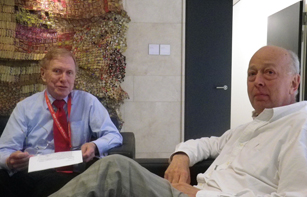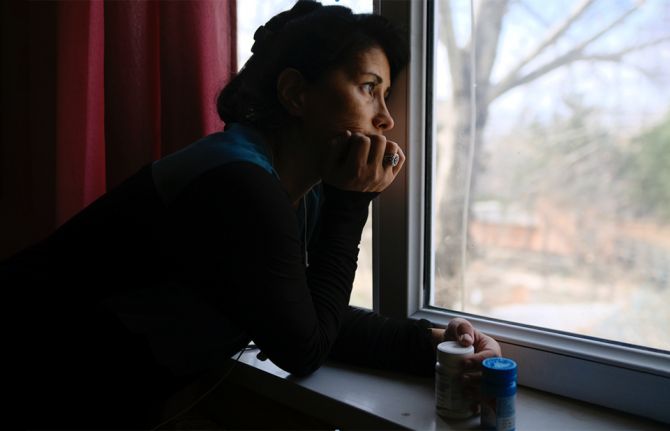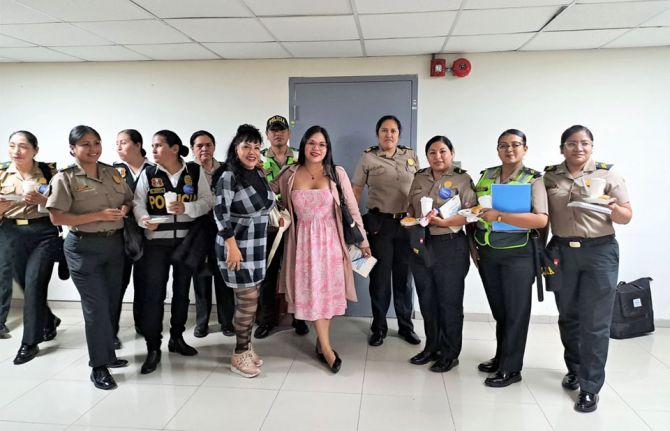
Feature Story
Expert meeting reviews scientific, medical, legal and human rights issues related to the criminalization of HIV exposure and transmission
07 September 2011
07 September 2011 07 September 2011
Justice Michael Kirby (left) and Professor Brian Gazzard during the expert meeting. Geneva, 02 September 2011.
World leading scientists and medical practitioners joined legal experts and civil society representatives to discuss the scientific, medical, legal and human rights aspects of the criminalization of HIV non-disclosure, exposure and transmission. The meeting, organized by UNAIDS, took place in Geneva from 31 August to 2 September.
Participants reviewed key scientific, medical, public health and legal principles that should inform the application of the criminal law to HIV. They also discussed recent developments in a number of countries where the criminalization of HIV is being reconsidered.
The meeting is part of a project to ensure that the application, if any, of criminal law to HIV exposure or transmission is appropriately circumscribed by the latest scientific evidence and legal principles in order to guarantee justice and protection of public health. The key points emanating from the expert meeting will be presented during a High Level Policy Consultation on the criminalization of HIV non-disclosure, exposure and transmission that will take place in Norway in the first quarter of 2012.
UNAIDS.org seized the opportunity to interview Professor Brian Gazzard (scientist and medical expert) and Justice Michael Kirby (a legal expert) to find out about their views on the significance, expected outcomes and potential impact of the expert meeting.
UNAIDS.org - As a scientist, what brings you to an expert meeting on the criminalization of HIV non-disclosure, exposure and transmission?
Professor Brian Gazzard (BG) - I'm not only a scientist, I'm a clinician. And I suppose as a clinician I'm interested for two reasons. One, it's become a very important agenda for most patients that I talk to. They want to know what the rules are about criminalization and the risks that it presents to them. Hopefully I've contributed to a more secure scientific knowledge about what the risks of transmission of HIV are, what the health status of somebody who's HIV infected are. I'm staggered about how little the courts still seem to know about these issues.
UNAIDS.org - What do you consider to be the role of scientists on addressing the overly broad criminalization of HIV non-disclosure, exposure and transmission?
BG - I think they have a role in pointing out what the science is. So what we're really trying to do is saying that HIV has become a manageable condition which should produce a near-normal lifespan if people have access to HIV treatment and of course, take it. This is a very different thing from the vision of the court where this is murder and the patient will die within a few months of the diagnosis and life is a disaster. Quality of life for most HIV patients, I'm pleased to say, is extremely good. And so, to actually have a situation where jurisdictions are still prosecuting people for attempted murder because HIV has been transmitted is totally unrealistic in my view.
Quality of life for most HIV patients, I'm pleased to say, is extremely good. And so, to actually have a situation where jurisdictions are still prosecuting people for attempted murder because HIV has been transmitted is totally unrealistic in my view
Professor Brian Gazzard
UNAIDS.org - In light of recent developments including evidence of the benefits of highly active antiretroviral treatment (HAART), can HIV transmission or exposure still be characterized as murder or attempted murder under the criminal law?
BG - In my view clearly not and I think any prosecutions for that would fail, but of course, even being put up for prosecution is a pretty painful process. I think it's important that prosecutorial guidelines say that this is not reasonable.
UNAIDS.org - More broadly, in your view, how should a better understanding of scientific evidence inform the criminal law in the context of HIV?
BG – Defining the intention to do harm is a complex legal issue. The probability of transmission of HIV to another person is quite low, particularly in the context of safer sex with a condom, or for people who are on HIV treatment. Whether a given individual transmits HIV or not would be a very rare and arbitrary event. So I think science is important in clarifying these facts. It isn't that the risk is so high that you have an intent when you have sex with somebody; the risk is actually very low indeed.
UNAIDS.org - In your opinion, is there any legal evidence to support the criminalization of HIV?
Justice Michael Kirby (MK) - There are some exceptional cases where the criminal law has a role to play. However, the criminal law has been pushed into a whole range of other activities which are counter-productive from the point of view of a public health response to HIV. The use of criminal law is also likely to lead to disproportionate and highly punitive measures which are not helpful in responding to the epidemic in a way that prevents the spread of HIV.
UNAIDS.org - Criminalization of HIV non-disclosure, exposure and transmission has been enforced for a number of years. Is there anything new or different in 2011?
MK - There are a number of developments which make for difference. For example, when in 2008 the original guidelines on criminalization of HIV transmission were adopted, the suggestion was not to have specific laws against HIV but to leave it to the general criminal law to deal with any egregious cases, very serious cases. We now realize that the general criminal law will often have concepts in it which are very uncertain concepts, such as criminal intention, and will also have provisions in it which are difficult to apply in the context of HIV.
Other developments have been the advances in antiretroviral treatment and, of course, a better understanding of the validity and limitations of the phylogenetic test.
So there have been technological, scientific developments, but also the realization that the 2008 guidelines didn't cover all of the issues.
UNAIDS.org - Do you think this meeting will advance efforts against the overly broad use of criminal law in the context of HIV? And if so, what needs to be done?
MK - I think the value of the group has been that it has a mixture of science and law [experts] and it has a good representation of people living with HIV. That has allowed us to look again at how and what we can do to explain the new realities of the epidemic and put forward new guidelines to help countries react appropriately regarding the criminalization of HIV.
HIV infection is not the death sentence that it was thought to be when HIV first appeared and we have to modify our policies in accordance with the developments in science and technology.
HIV infection is not the death sentence that it was thought to be when HIV first appeared and we have to modify our policies in accordance with the developments in science and technology
Justice Michael Kirby
UNAIDS.org - As a member of the UNDP-led Global Commission on HIV and the Law, how do you see this meeting contributing to the overall objective of addressing punitive laws that negatively impact the HIV response?
MK - This issue has not been a big feature of the Global Commission’s work in which I’ve been involved to date. The value of the UNAIDS driven expert meeting is that it fills an important gap. What has been discussed around our table with the inter-disciplinary people who have participated can be fed into the debates of the Global Commission and that’s exactly what I’m going to be doing.
Professor Brian Gazzard is the Clinical Research Director of the HIV Unit at the Chelsea and Westminster Hospital, one of the largest clinical units in Europe. He was also the founding Chair of the British HIV Association (BHIVA) and chaired the BHIVA Executive from 1995-2004. Brian Gazzard is also Chair of the Expert Advisory Group on AIDS (EAGA), an advisory body to the Department of Health in the United Kingdom.
Justice Michael Kirby is a retired judge of the High Court of Australia. At the time of his retirement, Justice Kirby was Australia’s longest serving judge. Since the early days of the epidemic, Justice Kirby served on many national and international bodies concerned with HIV. He currently serves as a member of the Global Commission on HIV and the Law. He is also a member of the UNAIDS Reference Group on HIV and Human Rights.
Publications
Publications
- Report on the expert meeting on the scientific, medical, legal and human rights aspects of criminalisation of HIV non-disclosure, exposure and transmission Background document
- Criminalisation of HIV Non-Disclosure, Exposure and Transmission: Scientific, Medical, Legal and Human Rights Issues
- Criminalisation of HIV Non-Disclosure, Exposure and Transmission: Background and Current Landscape



